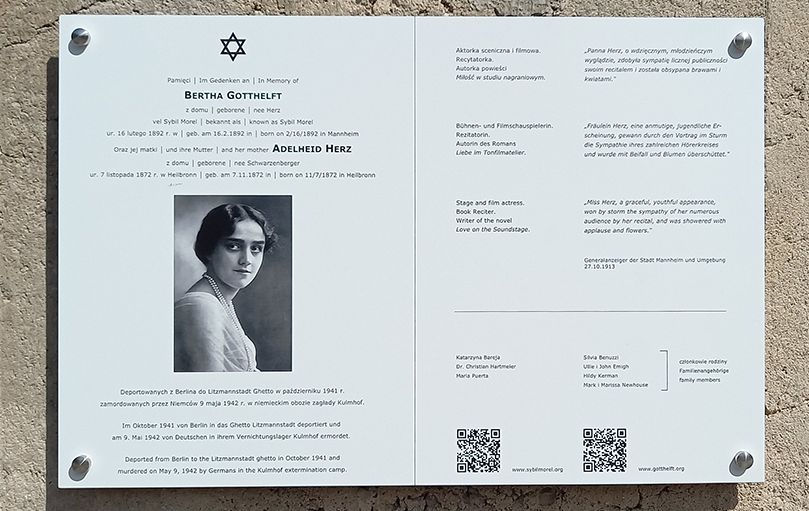e-book Sybil Morel:
Profession? Moviestar!
2022 saw the 130th anniversary and the 80th anniversary of the jewish stage and film actress Sybil Morel.
I am taking these two dates as an opportunity to commemorate her by reissuing her novel, Love on the Soundstage, which she wrote after her screen career had ended.
This autobiographical novel is a reckoning with the film industry as Sybil experienced it during her career.
It is now available as a Kindle e-book here:
Amazon USA / Amazon UK
Click here for my biographical sketch of Sybil, whose real name was Bertha Gotthelft.
Consecutive parts of it will be published at irregular intervals. Just drop by from time to time or let me notify you. I will be happy to send you an e-mail as soon as there is more to read about Sybil.
You can send your message here.
Memorial plaque in Poland
Sybil and her mother were murdered by the Nazis and their helpers in the Chełmno extermination camp.
After my visit there, I decided to design a memorial plaque for the two women.
The plaque was placed on the memorial wall in July 2024. More about this at the end of this website.
Pamięci │ Im Gedenken an │ In Memory of
Bertha Gotthelft
z domu │ geborene │ nee Herz
vel │ bekannt als │ known as Sybil Morel
ur. 16 lutego 1892 r. w │ geb. am 16.2.1892 in │ born on 2/16/1892 in Mannheim
Oraz jej matki │ und ihre Mutter │ and her mother Adelheid Herz
z domu │ geborene │ nee Schwarzenberger
ur. 7 listopada 1872 r. w │ geb. am 7.11.1872 in │ born on 11/7/1872 in Heilbronn

Bertl Herz - Sybil Morel - Bertha Gotthelft
16.2.1892 until 9.5.1942
"Among the half-dozen actors one name that I have not heard before stands out, nor do I seem to have encountered its owner before, neither on stage nor on film.
Sybil Morel.
She plays a Chinese girl who is freed from a life of vices in an opium den by an European. However she performs this rather thankless role [...] with such charm that I understand the applauses given to this beautiful little woman in her box, when she was presented with a few flower pots.
She moves [...] with an unaffected grace which - already at her first appearance on the screen - secures her the sympathy of the audience. I am of the opinion that here Mr. Reinert has made a new discovery."
Egon Jacobson on February 15, 1919 in the magazine „Kinematograph“ after the premiere of Robert Reinert's „Opium“.
Stages in Sybil's life
Mannheim
National Theater
Chemnitz
United City Theaters
Berlin
Stage plays, recitation evenings, cinema films, radio contributions
Missing
Łódź - Litzmannstadt
Ghetto
Chelmno - Kulmhof
Murdered
What You can read in the book about Sybil Morel:
#Career
Although Sybil became a half-orphan at the age of 8, she managed to fulfill her lifelong dream:
She took classes at acting schools, achieved engagements on big stages and finally went into film.
Her breakthrough came with her third film.
Within 13 years she appeared in over 50 productions.
#Cinema
In the 1920s films were produced massively.
Technology developed so rapidly that today's new thing was old by tomorrow.
Audiences celebrated their favorites frenetically at premieres.
Stars and starlets rose and fell overnight.
In the midst of this hype: Sybil!
#MeToo
In the first years of her career Sybil appeared in one film after another.
Then the roles became fewer.
There is circumstantial evidence that Sybil resisted the advances of a film magnate, who therefore hindered or even destroyed her career.
MeToo is not only an experience of our time.

#Jewish
Sybil came from a Jewish family.
She therefore suffered at the hands of the Nazis, who were hostile to Jews after 1933.
She moved in with her mother. Together they tried to get through the dark years.
At the end of Sybil's life, she spent 6 months in the ghetto and was murdered in an extermination camp
The sacred lie
1927
"What is most deeply affecting, however, is the almost consummate acting in this supremely instructive film. The most remarkable acting is provided by Sybil Morel as the mother."
Tages-Post,
Linz, August 28, 1928
"Sybil Morel , as the mother, is the center of the film. Her touching, restrained performance dominates the work, which is worthy of the artist."
Illustrierte Kronen-Zeitung,
Vienna, March 9, 1928

Stars on tour
Events with cinema stars were booming.
In December 1926 well-known actors made guest appearances in Kassel.
Among the stars on tour were Sybil and her longtime film partner Bernd Aldor.
Sybil knew Kassel well. Ernst Gotthelft, whom she had married in 1918, was a native of that city.
His family had run a print shop there since 1841 and published the „Kasseler Tageblatt“, one of the most important newspapers in Hessen.

The Gotthelfts
300 years of German-Jewish history
The Gotthelft story is
fabulous,
adventurous,
exciting,
tragic,
gruesome,
touching.
Wir benötigen Ihre Zustimmung zum Laden der Übersetzungen
Wir nutzen einen Drittanbieter-Service, um den Inhalt der Website zu übersetzen, der möglicherweise Daten über Ihre Aktivitäten sammelt. Bitte überprüfen Sie die Details in der Datenschutzerklärung und akzeptieren Sie den Dienst, um die Übersetzungen zu sehen.






